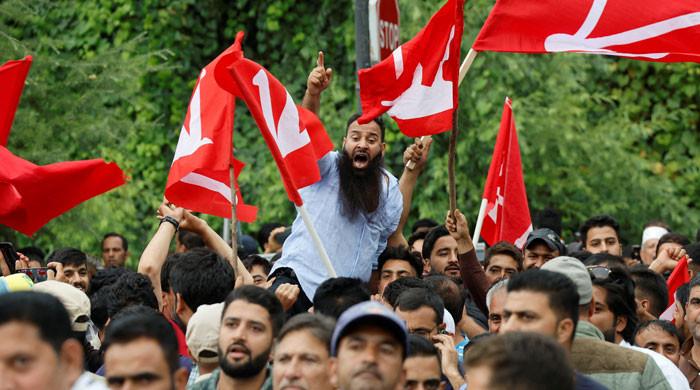Opposition alliance clinches majority seats in IIOJK elections

SRINAGAR: With voters backed opposition parties to lead its regional assembly, Indian Illegally Occupied Jammu and Kashmir (IIOK) elected on Tuesday its first government since the restive Himalayan territory was brought under New Delhi’s direct control.
Hindu nationalist Prime Minister Narendra Modi’s government cancelled the occupied region’s partial autonomy to control its affairs in 2019, a sudden decision accompanied by mass arrests and a months-long communications blackout.
Since then, the Muslim-majority territory has not had an elected local government.
Instead, it has been ruled by a governor appointed by New Delhi.
While voters took part in national elections in June when Modi won a third term in power, these were the first local elections since 2014.
As results were announced, with an alliance of the opposition National Conference (NC) and Congress parties to form a government, supporters celebrated.
Election Commission figures showed NC and Congress had won 48 of 90 seats in the assembly, with Modi’s Bharatiya Janata Party (BJP) coming a distant second with 29.
Some called the vote a de facto referendum on the federal government’s decision to repeal the territory’s special status.
“The people have given their judgement against what New Delhi did,” social activist Iqbal Ahmad Bhat said.
But Modi said he was “proud” of the BJP’s performance, saying that enthusiasm for the election was reflective of “the people’s belief in democracy”.
Half a million Indian troops are deployed in the far northern region, battling a 35-year insurgency in which tens of thousands of civilians, soldiers and freedom fighters have been killed, including dozens this year.
‘Political rights’
“We are happy with the election results, and hope that the political rights will be restored,” said Jahangir Ahmad, among the cheering crowds outside the home of the territory’s expected new chief minister, NC leader Omar Abdullah.
Abdullah told reporters that people had “voted resoundingly against the policies of the BJP”.
Critics, however, say the assembly will only have nominal powers over education and culture.
New Delhi will also have the power to override legislation, and will continue to appoint the governor.
The BJP won seats in the southern Hindu-majority Jammu region, and fought only from about a third of the seats in the occupied valley.




